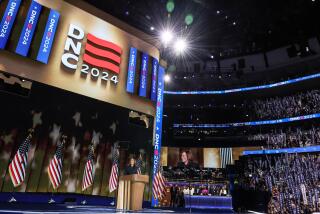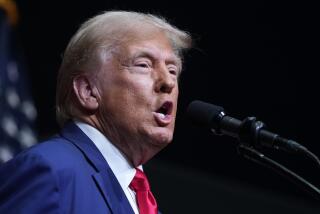Bush Defends Retirement Deal for Cheney
- Share via
PRESCOTT, Ariz. — George W. Bush said Saturday he saw nothing improper with the large retirement payment that Dick Cheney’s oil company voted him just days before Bush selected him as his running mate.
And Bush said he would not ask Cheney to disqualify himself from energy-related issues, should the Republican presidential ticket win the White House.
Bush, interviewed by The Times before he began a vacation during this week’s Democratic National Convention in Los Angeles, also fired a brisk series of parting shots at his political rivals.
He accused Democratic nominee-in-waiting Al Gore of massively understating the cost of a proposal to help Americans save for retirement and signaled he would seek to repeal President Clinton’s program to help cities hire more police officers, arguing it was a misplaced use of federal dollars.
He also forcefully insisted that Clinton and Gore were mistaken in arguing that the country is better off today than it was eight years ago when his father, George Bush, left the White House.
“If I was in their shoes, I’d be making the same case, [but] I don’t think it is correct,” Bush said. “Because if you look at the school system, I don’t think the school system is better off. I don’t think the morale in the military is better off. I don’t think our standing in the world is better off.
“No question the stock market is higher. But prosperity hasn’t reached throughout all of society. The Social Security system is not better off . . . Medicare . . . the housing programs are not better off. The number [without health insurance] has grown in America.”
With those words, Bush intensified a debate over the legacy of the Clinton years that Democrats are eager to join. One of the central aims of this week’s convention is to convince voters that on most key economic and social measures--from crime to unemployment and the federal budget--the nation now is in a stronger position than when Bush’s father was president.
Bush said he anticipated the Democratic gathering would “ridicule” his record as governor of Texas, though he added that he didn’t plan to hear much of it as he vacations on his ranch in Crawford, Texas.
“I anticipate they are going to try to tear down my record . . . ,” Bush said. But in a reference to limited broadcast television coverage of the convention, he added, “Since I don’t have cable on the ranch, I probably won’t be watching much of it, however.”
Sitting in shirt sleeves, Bush was relaxed and appeared confident during the interview, which took place as he flew from a campaign appearance Saturday in Everett, Wash., to the small town of Prescott. He was accompanied by Sen. John McCain (R-Ariz.), his former rival for the GOP nomination who was hosting Bush on Saturday night at his ranch in nearby Sedona.
Bush was emphatic in defending Cheney against any suggestion of impropriety in the retirement package granted by Halliburton Co., the oil services firm where Cheney served as chairman and chief executive officer for five years.
The New York Times reported Saturday that five days before Cheney’s selection as Bush’s running mate last month, the company’s board of directors voted him a retirement package worth an estimated $20 million, a deal roughly $10 million higher than if the board had insisted he resign instead. A source close to Cheney confirmed Saturday the estimate was “on the mark.”
Bush made clear the arrangement did not concern him. “I was aware that he was going to get a retirement package, like the standard practice for CEOs when they leave major companies,” he said. “I think what you ought to do is ask: Does the board of directors know what they are doing, are they expert, and let the experts make the decision as to what’s fair.”
Bush said he saw no reason to ask Cheney to recuse himself from energy-related policy if elected. “I’m going to take [Cheney’s] advice on how to make our country less dependent on foreign sources of crude oil. I think he’s a man of strategic vision; he sees the world the way it is and he’s got good judgment.”
He added: “What I want him to do is not be owning oil stocks so he benefits from decisions we make in the administration. . . . He’ll follow the same rules I’ll follow and that is we’ll put all of our assets in blind trusts.”
Cheney has said he will sell off his Halliburton stock after the election if the ticket wins.
Asked about Bush’s comments, Gore spokesman Chris Lehane did not criticize the governor’s comment that Cheney would participate in energy-related decisions. But Lehane said the Halliburton payment underscored the GOP ticket’s ties to the oil industry: “What that means is they will potentially transfer the Oval Office into the Big Oil office,” Lehane charged.
On another matter, Bush on Friday had challenged Gore to more clearly state his disapproval of Clinton’s personal conduct in the Monica S. Lewinsky scandal. But in Saturday’s interview, Bush struck a less confrontational tone.
He repeated his criticism of Clinton’s behavior as an “embarrassing moment” for the country. But he added that “the president personally is not the issue” because “he’s not running.”
On the policy front, Bush charged that Gore was massively understating the cost of tax breaks the vice president has proposed to help low- and middle-income families establish individual retirement accounts as a supplement to Social Security. Gore has estimated the 10-year cost of that proposal at about $200 billion; Bush said if all those eligible sought the benefit, the real cost would be as much as $1.7 trillion.
“I think if you take a look at the programs he’s proposed and run them out to their logical conclusions, he’s spent most of the [budget] surplus, if not more than the surplus,” Bush said.
Gore has used the same argument against Bush, focusing on the Republican’s call for sweeping cuts in income tax rates.
Bush also escalated his policy criticism of the Clinton years, saying that the president’s administration would be defined by both scandal and missed opportunities, such as the failure to expand the North American Free Trade Agreement beyond Mexico and Canada.
Bush flatly rejected the contention from Clinton and Gore that their economic policies, particularly the 1993 deficit-reduction package that passed Congress solely on Democratic votes, had contributed to the nation’s boom times.
“I think the economy has grown really in spite of government,” Bush said. “This is an incredible period of time when productivity has been enhanced, not because of any great initiative of government, but because of the whole Internet development . . . the new commerce, the ability for entrepreneurs to stake a new claim. The new wealth has been created in the private sector, not the public sector.”
When asked if he would seek to repeal Clinton’s AmeriCorps program that provides subsidies to young people who engage in national service, Bush said he would wait to evaluate the effort’s effectiveness.
But he said he would seek to eliminate the president’s COPS initiative, which has spent billions of federal dollars to help local governments hire thousands of police officers. The program has faced stiff criticism from Republicans, who maintain it has not produced nearly the 100,000 new police officers Clinton promised. Gore, for his part, has pledged to expand the effort to hire another 50,000 cops.
“I don’t think that is a federal initiative. . . . I think that’s a local program,” Bush said. “I view that as focus-group politics that breaches the role of what the federal government should do.”
Lehane charged that Bush’s comments displayed wrongheaded priorities in both spending and law enforcement. Referring to a law Bush signed in Texas, Lehane said, “His policies would allow people to carry concealed weapons but not put more cops on the street,” Lehane said.
Bush said he considered Gore’s selection of Sen. Joseph I. Lieberman of Connecticut as his running mate a “good pick” for the Democrats. “I like the tone [Lieberman] sets,” Bush said. “He seems like a very decent man, respectful of the process.”
But Bush said that the selection of Lieberman, who has backed school voucher proposals similar to Bush’s, could give the GOP ticket an opportunity “to help foster [their] case” in the education debate with Gore.
More to Read
Get the L.A. Times Politics newsletter
Deeply reported insights into legislation, politics and policy from Sacramento, Washington and beyond. In your inbox twice per week.
You may occasionally receive promotional content from the Los Angeles Times.










